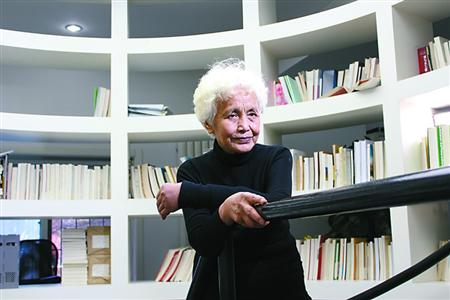
File photo of Jiang Shumei.
"There was no food left in my house. I picked up carrots on my way home. My family had eaten carrots for 40 days. It should have been sweet, but when I put one on my tongue again, I tasted nothing but bitterness. I could not eat it any more, nor could my son."
Jiang Shumei's memory of hunger during China's "Great Leap Forward" movement in the late 1950s is a rare insight into a period rarely mentioned in history textbooks.
The 80-year-old woman peasant has included it in her maiden work "Poor Time, Troubled Time", a collection of short stories mainly about ordinary people in north China's countryside who suffered from years of famine and political turmoil.
Published in 2013, the book quickly became a sensation nationwide and won many literature awards. But many readers were surprised to learn the author was an illiterate grandmother who learned how to read at age 60, and became a writer at 70.
TEENAGE DREAM
Jiang has the drive and enthusiasm of a writer half her age.
She has published a book every year since 2013. She went back to the countryside last year, carrying a notebook and a recorder, to record folktales from elderly villagers for her third book, "The Woman with a Long Neck".
The collection won a national award earlier this month. On the podium, silver-haired Jiang, dressed in a purple cheongsam and wearing a string of pearls, was far removed from the common image of a village woman.
But when she spoke, her strong accent marked her out from other winners, including journalists, novelists and sociologist. Some say that while Jiang can share literary awards with the educated, the educated could hardly write Jiang's stories.
"All her stories have a strong sense of the land or wildness, similar to Mo Yan's style of story-telling," says Ma Boyong, a well-established novelist.
Jiang came from the same province as the Nobel Prize winner. Born in an official's family in 1937 in Shandong's Juye County, Jiang's father and brothers received good education, and they were revered for building schools in villages.
However, years of political upheaval reversed the family's fortunes.
Their land was confiscated and houses separated. Jiang suffered starvation after an arranged marriage. In 1960, she escaped with her husband and children from famine to northeast Heilongjiang Province, where the couple worked as low-paid factory workers till retirement.
Like many her age, Jiang devoted most her life to raising children. When her husband died in a car accident in 1996, her daughter advised her to find a pastime to ward off loneliness. Rural women of her generation at large never went to school, so she realized her teenage dream and learned to read and write.


















































